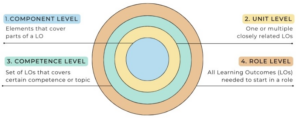One of the key objectives of ESSA (European Software Skills Alliance) is to make recognition of learning outcomes easy and flexible to be able to more efficiently upskill and reskill individuals into in-demand software roles.
One way to make this a reality is to accelerate the use and development of digital badges and micro-credentials at the European level. To understand how this is done in the ESSA project and why they are so important in the software services sector, education expert and researcher Wanda Saabeel (Irish Computer Society) shares some insights on the future of certification.
The rise of micro-credentials
More than just a buzzword, micro-credentials offer promising avenues for widening access to education and fast-tracking upskilling and reskilling in sectors like software services where the workforce needs to keep up with technological advancements to stay relevant. Supportive policies and frameworks are put in place to unlock their full potential.
In 2022, the European Council put forward a recommendation to take up micro-credentials to help certify the outcomes of small, targeted learning experiences. UNESCO’s International Institute for Educational Planning published a blueprint for policy development and action related to short courses, micro-credentials, and flexible learning pathways, expecting that these will become a regular and even dominant feature of education and training globally. In August 2022, the OECD launched their Micro-credential Implementation Project to assist countries in their efforts to develop national measures, aiming to strengthen the evidence base on the current and near-term potential of micro-credentials and focusing on a set of implementation and monitoring indicators that countries can use by the end of 2023.
Micro-credentials are also mentioned in the European Commission’s Staff Working document, published in April 2023, accompanying the Proposal for a Council Recommendation on the key enabling factors for successful digital education and training and the Proposal for a Council Recommendation on improving the provision of digital skills in education and training. These documents highlight the importance of micro-credentials in tackling the ICT skills shortage in Europe.
Worldwide, many articles and several handbooks and frameworks have been published. Micro-credentials are becoming more and more embedded in national education systems (e.g., Ireland, Spain, Estonia, Netherlands, Canada, New Zealand, and Australia). The governments in other regions, particularly Asia-Pacific, are taking similar steps to develop a policy infrastructure for micro-credentials.
Micro-credentials in the ESSA project
Learning providers are increasingly offering micro-credentials — often by partnering with other institutions, industries and learning platforms. More and more, large tech companies, not-for-profits and other organisations also invest in micro-credentials and digital badges. From big vendors offering certificates on their products to independent certification institutes, such as ESSA Associated Partners EXIN and Certiport, the ICT sector is already familiar with micro-credentialing.
ESSA reconciles the different approaches and good practices benchmarked in its Software Skills Strategy for Europe and offers a certification framework which has been developed to ensure stackability and modularisation.
The framework builds on the ESSA educational profiles and consists of 4 aggregation levels of micro-credentials that can be stacked up to a full programme degree like a Master covering all learning outcomes needed to start in a software role.
Figure: Aggregation levels in ESSA certification framework
- Component level: badges covering a relatively small amount of learning which are parts of a given learning outcome
- Unit level: a set of badges comparable with the size of a standard vendor certificate or a course of an educational provider
- Competence level: a set of badges indicating that somebody has mastered a set of skills on a specific topic that they can apply in their professional environment
- Role level: a badge to prove that somebody has all the skills needed to qualify for a certain software role because a set of micro-credentials was achieved. This level can be compared to, for example, a VET diploma.
The framework works with learning outcomes that are independent of the way they were achieved — whether it is by informal learning, a university degree, or other types of training. This increases the comparability of the skills and competences professionals have mastered.
Is your organisation using micro-credentials?
ESSA lays out the possibilities for the implementation of an ESSA digital badge system to cover the learning pathways of 5 professional software roles — Developer, DevOps expert, Solution designer, Test specialist, and Technical (software) specialist. To this end, ESSA is enhancing and updating the mapping of professional certifications, qualifications, and degrees on a rolling basis and organisations who have experience and expertise in certification/digital badges are welcome to join the Alliance.
Cover Picture by Shayna Douglas on Unsplash.

